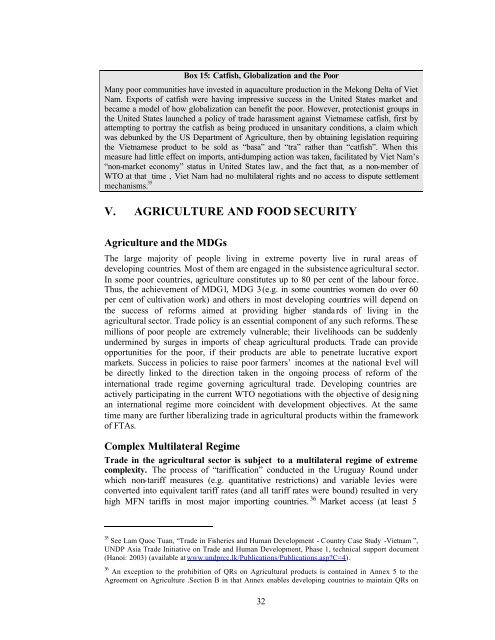Trade Policy Note Final-rev08 - Development
Trade Policy Note Final-rev08 - Development
Trade Policy Note Final-rev08 - Development
Create successful ePaper yourself
Turn your PDF publications into a flip-book with our unique Google optimized e-Paper software.
Box 15: Catfish, Globalization and the Poor<br />
Many poor communities have invested in aquaculture production in the Mekong Delta of Viet<br />
Nam. Exports of catfish were having impressive success in the United States market and<br />
became a model of how globalization can benefit the poor. However, protectionist groups in<br />
the United States launched a policy of trade harassment against Vietnamese catfish, first by<br />
attempting to portray the catfish as being produced in unsanitary conditions, a claim which<br />
was debunked by the US Department of Agriculture, then by obtaining legislation requiring<br />
the Vietnamese product to be sold as “basa” and “tra” rather than “catfish”. When this<br />
measure had little effect on imports, anti-dumping action was taken, facilitated by Viet Nam’s<br />
“non-market economy” status in United States law, and the fact that, as a non-member of<br />
WTO at that time , Viet Nam had no multilateral rights and no access to dispute settlement<br />
mechanisms. 35<br />
V. AGRICULTURE AND FOOD SECURITY<br />
Agriculture and the MDGs<br />
The large majority of people living in extreme poverty live in rural areas of<br />
developing countries. Most of them are engaged in the subsistence agricultural sector.<br />
In some poor countries, agriculture constitutes up to 80 per cent of the labour force.<br />
Thus, the achievement of MDG1, MDG 3(e.g. in some countries women do over 60<br />
per cent of cultivation work) and others in most developing countries will depend on<br />
the success of reforms aimed at providing higher standa rds of living in the<br />
agricultural sector. <strong>Trade</strong> policy is an essential component of any such reforms. These<br />
millions of poor people are extremely vulnerable; their livelihoods can be suddenly<br />
undermined by surges in imports of cheap agricultural products. <strong>Trade</strong> can provide<br />
opportunities for the poor, if their products are able to penetrate lucrative export<br />
markets. Success in policies to raise poor farmers’ incomes at the national level will<br />
be directly linked to the direction taken in the ongoing process of reform of the<br />
international trade regime governing agricultural trade. Developing countries are<br />
actively participating in the current WTO negotiations with the objective of desig ning<br />
an international regime more coincident with development objectives. At the same<br />
time many are further liberalizing trade in agricultural products within the framework<br />
of FTAs.<br />
Complex Multilateral Regime<br />
<strong>Trade</strong> in the agricultural sector is subject to a multilateral regime of extreme<br />
complexity. The process of “tariffication” conducted in the Uruguay Round under<br />
which non-tariff measures (e.g. quantitative restrictions) and variable levies were<br />
converted into equivalent tariff rates (and all tariff rates were bound) resulted in very<br />
high MFN tariffs in most major importing countries. 36 Market access (at least 5<br />
35 See Lam Quoc Tuan, “<strong>Trade</strong> in Fisheries and Human <strong>Development</strong> - Country Case Study -Vietnam ”,<br />
UNDP Asia <strong>Trade</strong> Initiative on <strong>Trade</strong> and Human <strong>Development</strong>, Phase 1, technical support document<br />
(Hanoi: 2003) (available at www.undprcc.lk/Publications/Publications.asp?C=4).<br />
36 An exception to the prohibition of QRs on Agricultural products is contained in Annex 5 to the<br />
Agreement on Agriculture .Section B in that Annex enables developing countries to maintain QRs on<br />
32
















